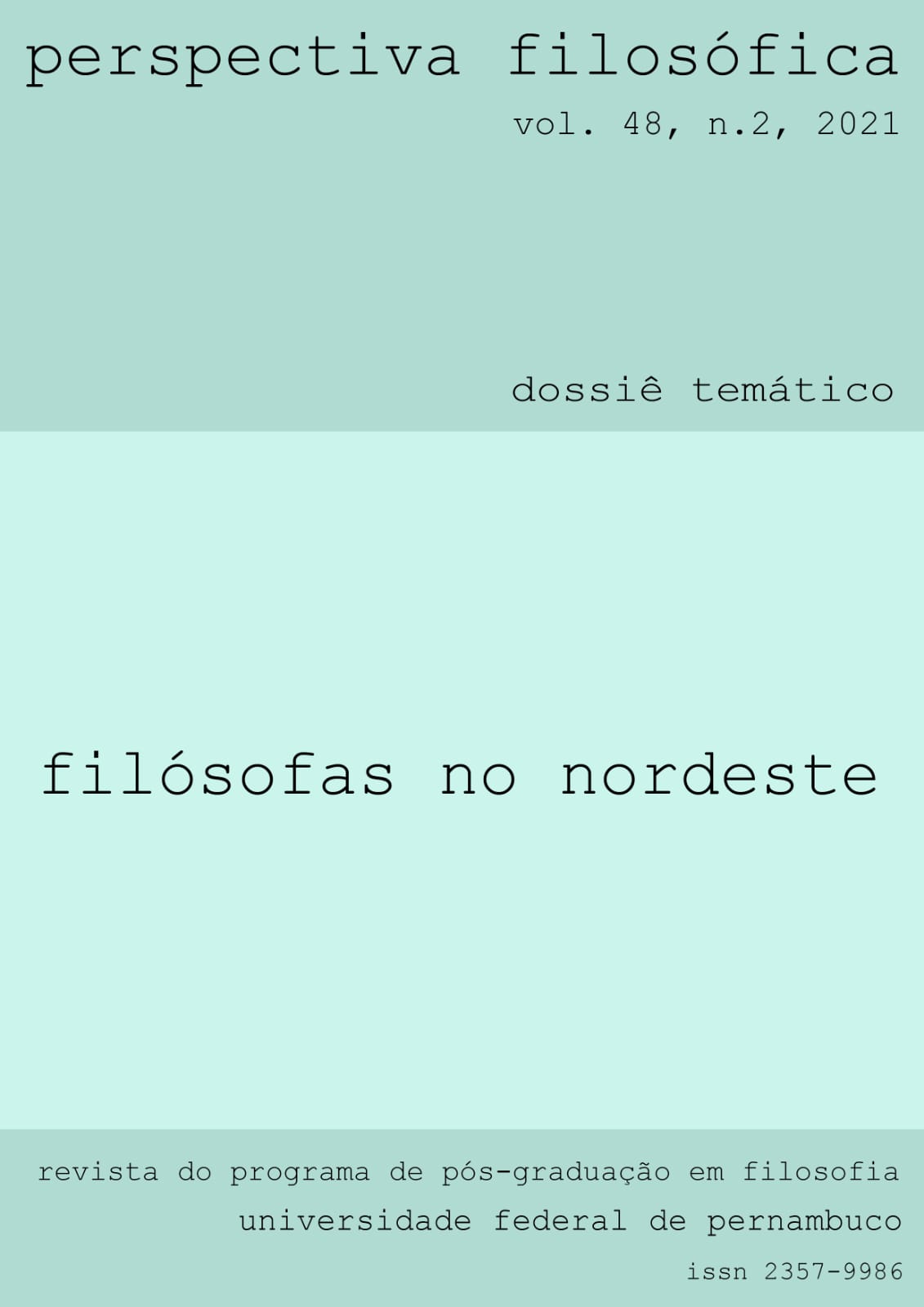Body narratives and political alliances in public spaces: listening to silenced voices
DOI:
https://doi.org/10.51359/2357-9986.2021.249301Keywords:
Judith Butler, political action, performance, standpoint theoryAbstract
The body and its action is the primary place of philosophy, it is the political force that endures today through assemblies, meetings, and performances held by women and dissidents bodies. Different narratives are capable of building powerful affective political alliances to revert to the different types of silences that we are subject to. Butler proposes to understand not only discourse as performativity but also to include the action that emerges between bodies. Actions that present themselves as gestures, movements, persistence and also contemplate possible violence that can reconfigure the space of politics and what we can consider public in it. Therefore, the objective is to bring Butler's notes to think about the power of this thinking and speaking body, what are the narratives he builds and strategies of struggle are created by their use. Therefore, the objective is to bring Butler's notes to think about the power of this thinking and speaking body, what are the narratives he builds and strategies of struggle are created by their use. The paper is divided into three parts. First, update of Arendt's concept of political action as performance, by Butler. Second, performativity is not just discourse, whether written or spoken, but it is also updated in bodily actions, in assemblies, and on the streets. Third, the strategies of fighting for the word, the recognition of other voices and writings of the body.References
AHMED, Sara. The Cultural Politics of Emotion. Edinburgh and London: Edinburgh University Press and Routledge Press, 2004.
AHMED. Living a Feminist Life. Durham, North Carolina: Duke University Press, 2017.
ANZALDÚA, Gloria. Bordelands: the new mestiza/La Frontera. San Francisco: SPinters-Aunt Lute, 1987.
ANZALDÚA. “Hablar en lenguas”. In: MORAGA, C. y CASTILHO (eds.) Esta puente, mi espalda. San Francisco: Ism Press, 1988.
ARENDT, Hannah. A Condição Humana. São Paulo: Forense Editora, 2016.
AUSTIN, J. L. Quando dizer é fazer: palavras e ação. Tradução: Danilo Marcondes de Souza Filho. Porto Alegre: Editora Artes Médicas, 1990.
BACH, Ana Maria. Las voces de la experiência. Editorial Biblos, 2010.
BUTLER, Judith. Corpos em aliança e a política das ruas: notas para uma teoria performativa de assembleia. Tradução: Fernanda Siqueira Miguens. Rio de Janeiro: Civilização Brasileira, 2018.
FELMAN, Shoshana. The Scandal of the Speaking Body: Don Juan with J. L. Austin, or Seduction in Two Languages. Translated by Catherine Porter; with a new foreword by Stanely Cavell and afterword by Judith Butler. Meridian: Crossing Aesthetics. Stanford University Press, 2002.
JELIN, Elisabeth. “¿De qué hablamos cuando hablamos de memorias?”. In: JELIN, Elisabeth. Los trabajos de la memoria. Madrid: Siglo XXI, 2001. p. 17-38.
KAUR, Rupi. Outros jeitos de usar a boca. São Paulo: Editora Planeta Brasil, 2017.
LUGONES, M. “Playfulness, ‘World’-Traveling, and Loving Perception”. In: GARRY, A. y PEARSALL, M. (eds.). Women, Knowledge and Reality. Nueva York: Routledge, 1996.
MÁRCIA X- ARQUIVO X. Rio de Janeiro: Museu de Arte Moderna do Rio de Janeiro, 2013.
MARIM, Caroline. “Filosofia como performance – conceitos em movimento”. In: O que não é performance. Organizado pelo Coletivo Sem Título, 2016. Disponível em: https://www.academia.edu/30184929/Filosofia_como_Performance_conceitos_em_movimento. Acesso em: 12 jan. 2021.
MORAGA, C. y ANZALDÚA, G. This bridge called my back: Writings by radical women of color. Nueva York, Kitchen Table: Women of Color Press, 1983.
ORLANDI, Eni P. As formas do silêncio: no movimento dos sentidos. Campinas: Ed. da Unicamp, 2002.
PRENSA LATINA. “Muro de três milhões de mulheres pede justiça de gênero na Índia.” Nova Deli, 04/01/2019. Disponível em: https://www.pressenza.com/pt-pt/2019/01/muro-de-tres-milhoes-de-mulheres-pede-justicade-genero-na-india/. Acesso em: 12 jan. 2021.
PUIG DE LA BELLACASA, María. Matters of Care: Speculative Ethics in More than Human Worlds. Posthumanties 41. Minneapolis, London: University of Minnesota Press, 2017.
RICART, Paola M M. Transarquivo: uma escrita revolucionária de relatos da história da arte. Curitiba: Editora CRV, 2018.
SCHECHNER, R. “O que é performance?”. In: Percevejo, ano 11, 2003, n. 12: p. 25-50.
SERAFIM, Estefania Lima e Gustavo. Caderno Urdume. Instituto Urdume, 2020. Disponível em: www.urdume.com.br.
SPIVAK, Gayatri Chakravorty. Pode o subalterno falar? 1. ed. Tradução: Sandra Regina Goulart Almeida; Marcos Pereira Feitosa; André Pereira. Belo Horizonte: Editora da UFMG, 2010.
Galindo, Regina José. Lo voy a gritar al viento (1999). Disponível em: http://www.reginajosegalindo.com/en/home-en/. Acesso em: 12 jan. 2021.
Guerrilla Girls. Do Women have to be naked to get into the Met. Museum? (1989). Disponível em: https://www.guerrillagirls.com/. Acesso em: 12 jan. 2021.
Guerrilla Girls. How many women had one-person exhibitions at NYC Museums last year? (1985/1986). Disponível em: https://www.guerrillagirls.-com/. Acesso em: 12 jan. 2021.
Guerrilla Girls. Only 4 commercial galleries in N.Y. show black women. (1985/1986). Disponível em: https://www.guerrillagirls.com/. Acesso em: 12 jan. 2021.
Downloads
Published
Issue
Section
License
A Revista Perspectiva Filosófica orienta seus procedimentos de gestão de artigos conforme as diretrizes básicas formuladas pelo Conselho Nacional de Desenvolvimento Científico e Tecnológico (CNPq). http://www.cnpq.br/web/guest/diretrizesAutores que publicam nesta revista concordam com os seguintes termos:
Os autores mantém os direitos autorais e concedem à revista o direito de primeira publicação, sendo o trabalho simultaneamente licenciado sob https://creativecommons.org/licenses/by/4.0/deed.pt_BR que permite o compartilhamento do trabalho com reconhecimento da autoria e publicação inicial nesta revista.
Os autores têm autorização para assumir contratos adicionais separadamente, para distribuição não-exclusiva da versão do trabalho publicada nesta revista, com reconhecimento de autoria e publicação inicial nesta revista (Consultar http://opcit.eprints.org/oacitation-biblio.html).

Esta revista está licenciada com uma Licença Creative Commons Atribuição 4.0 Internacional.













